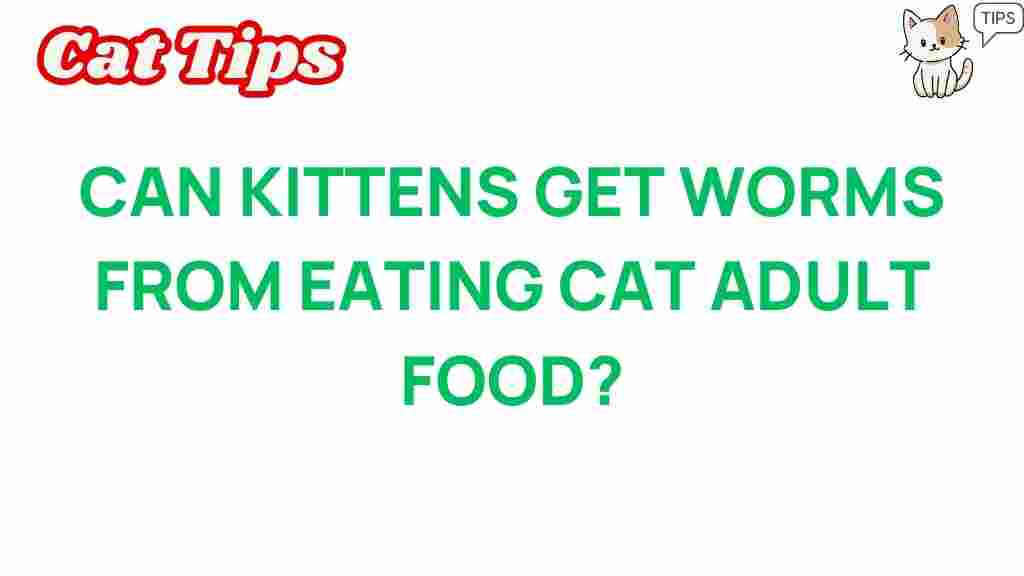Do Kittens Really Risk Worm Infestation by Eating Adult Cat Food?
Kittens are adorable, playful, and full of energy. As a new cat owner, one of the most crucial decisions you will make is about their diet. Many pet owners wonder if feeding their kittens adult cat food can lead to health issues, such as worm infestations. This article will explore the implications of feeding adult cat food to kittens, focusing on the risks of worm infestations and other nutritional considerations.
Understanding Kittens’ Nutritional Needs
Before diving into the potential risks of feeding adult cat food to kittens, it’s essential to understand what kittens need nutritionally. Kittens grow rapidly and require a diet that supports their development. Here are some key nutrients that are critical for kittens:
- Protein: Kittens require higher protein levels compared to adult cats to support their growth and energy levels.
- Fat: Healthy fats are vital for brain development and energy.
- Vitamins and Minerals: Essential for overall health, including calcium for strong bones and teeth.
- Water: Staying hydrated is crucial for kittens, especially when consuming dry food.
Adult cat food is formulated for the nutritional needs of fully grown cats, which are different from those of kittens. Feeding adult food to kittens can lead to nutritional deficiencies, affecting their growth and overall health.
Do Kittens Really Risk Worm Infestation?
One of the primary concerns when feeding kittens adult cat food is the risk of worm infestations. Kittens can be susceptible to various intestinal parasites, including roundworms, tapeworms, and hookworms. However, the direct relationship between feeding adult cat food and the risk of worm infestations is less clear-cut. Let’s break it down:
1. Nutritional Imbalance
As mentioned earlier, adult cat food lacks the necessary nutrients required for a growing kitten. A poor diet can weaken a kitten’s immune system, making them more susceptible to infections and infestations, including worms. While the food itself may not cause worms, the compromised health from nutritional deficiencies can increase the risk.
2. Exposure to Worms
Worm infestations typically occur through contact with contaminated environments or food sources. Kittens can contract worms from:
- Ingesting infected feces.
- Contact with other infected animals.
- Eating raw or undercooked prey.
Feeding kittens adult cat food does not directly expose them to worms but can potentially lead to a weakened state if their nutritional needs are not met.
3. Prevention of Worm Infestations
To ensure your kittens are healthy and to minimize the risk of worm infestations, consider the following steps:
- Choose Kitten-Specific Food: Always opt for food specifically formulated for kittens. This will provide the right balance of nutrients needed for healthy growth.
- Regular Vet Check-ups: Schedule regular veterinary visits for your kittens. This will help in early detection of any health issues, including worm infestations.
- Maintain Hygiene: Keep your living environment clean and free from feces to reduce the risk of contamination.
- Control Fleas: Fleas can carry tapeworms, so it’s essential to manage flea populations in your home.
Step-by-Step Guide to Feeding Kittens
To ensure you’re providing the best nutrition for your kittens, follow these steps:
1. Choose the Right Food
Look for high-quality kitten food that lists meat as the first ingredient. Avoid foods that contain fillers and artificial additives.
2. Gradual Transition
If you need to switch to a different brand, do so gradually over a week. Mix the new food with the old food to avoid digestive upset.
3. Monitor Feeding Portions
Follow the feeding guidelines on the food packaging. Kittens typically require three to four meals a day until they reach six months old, after which you can transition to two meals.
4. Fresh Water
Always provide fresh water for your kittens. Hydration is crucial, especially if they are eating dry food.
5. Keep an Eye on Their Health
Watch for any signs of health issues, such as lethargy, poor coat condition, or changes in appetite. If you notice any of these signs, consult your veterinarian.
Troubleshooting Tips for Common Issues
If your kittens experience any of the following issues, consider these troubleshooting tips:
1. Digestive Upset
If your kitten has diarrhea or vomiting after transitioning to adult food, revert to kitten-specific food and consult a vet if symptoms persist.
2. Poor Weight Gain
Ensure your kittens are eating adequate portions. If they are not gaining weight, consult your vet to rule out any health problems.
3. Worm Infestation Symptoms
If you suspect your kittens may have worms, look for signs such as:
- Weight loss despite a good appetite.
- Visible worms in feces or around the anus.
- Vomiting or diarrhea.
If these symptoms are present, consult your veterinarian for proper diagnosis and treatment.
Conclusion
Feeding kittens adult cat food does not directly cause worm infestations, but it can lead to nutritional deficiencies that may compromise their health and immune system. To ensure your kittens grow up healthy and thrive, feed them high-quality kitten-specific food, maintain good hygiene, and schedule regular veterinary check-ups. By following these guidelines, you can minimize the risks and enjoy the companionship of your playful kittens.
For more information on kitten care, check out our article on essential tips for raising a healthy kitten.
For further research on pet nutrition, consider visiting The American Association of Feed Control Officials (AAFCO) for reliable guidelines.
This article is in the category Health and created by CatTips Team
